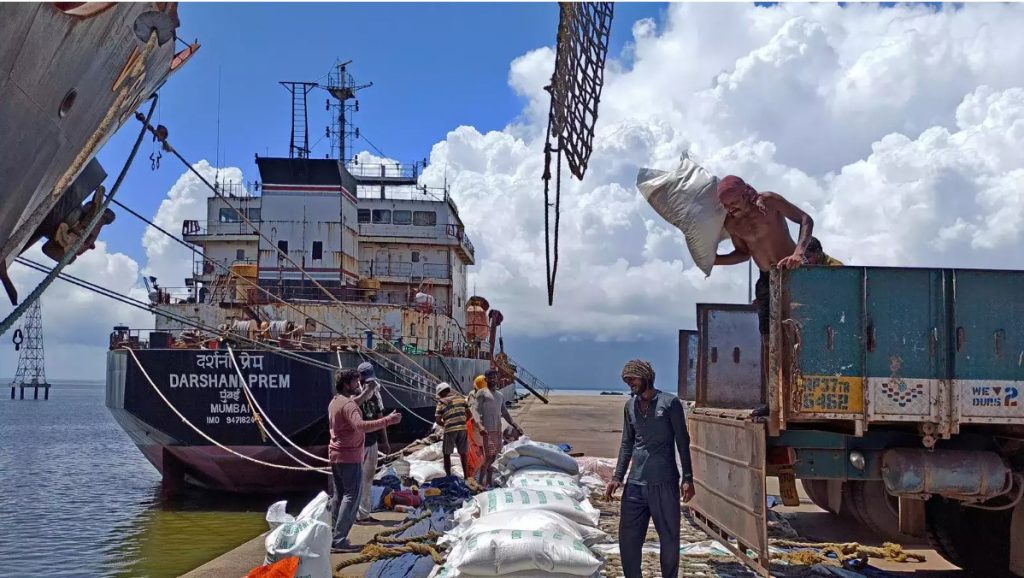While the share of goods in trade is declining, services exports are booming
The world is awash with reports that the world is de-globalising. President Trump was the initial de-globaliser, withdrawing from the Trans-Pacific Partnership, imposing protectionist tariffs, and curbing trade with China.
Later, US President Biden imposed stringent restrictions on sales of high-tech items to China and enacted the biggest ever subsidy legislation of $624bn to kick-start US investment in green technologies and microchips. Curbs on China induced many multinationals to shift operations from China to other low-wage countries. These events were called reshoring and friendshoring.
In India, economist Arvind Panagariya says as many as 3,000 tariff lines have suffered higher import duties in recent years, mainly to keep out cheap Chinese imports. India is offering a massive subsidy of up to 50% for chip fabrication plants. Its Production Linked Incentive offers subsidies of almost Rs 2tn, plus tariff protection, for new industries in 14 specified sectors.
Greater international integration has suffered. What some call hyper-globalisation has stalled. Yet Scott Lincicome of the Cato Institute has come out with a new paper titled ‘Globalization isn’t going anywhere’ that argues that reports of the death of globalisation are much exaggerated. It is alive and flourishing, above all, in underappreciated digital integration.
The ratio of goods trade to world GDP has stagnated since 2008 at a high level, but trade is rising in absolute terms. Global trade in goods hit a record $25tn in 2022. More relevant, global (and Indian) GDP is shifting inexorably from goods to services, The share of goods in trade is declining, but services exports are booming, and digital exports are skyrocketing.
India accounts for only 1.5% of global goods exports but over 4% of global service exports. In 2022-23, goods exports rose just 6% to $447bn while service exports soared 27% to $323 billion. If these trends continue, services exports will overtake goods exports in just three years. The share of total trade in GDP has risen from 39.9% in 2019-20 to 49.4% in 2022-23.
Global investment flows keep rising. The Economist says that in 2020 global financial assets touched $130tn, up almost 60% since 2007, representing 153% of world GDP. Foreign Direct Investment in India has risen from a negligible $70mn in 1991 to $83.6bn in 2020-21. Global capital has helped finance 138 Indian unicorns (unlisted companies worth over a billion dollars).
Over 1,400 multinationals have set up Global Capability Centres in India employing 1.3 million people with a turnover of $36bn in 2021. Migration is an increasing form of globalisation. Total global migrants increased from 153mn in 1990 to 281mn in 2020. The Indian diaspora is 32 million strong, and sent home remittances of $107bn last year, far more than foreign aid ever provided.
Lincicome says tourism and transport were historically the biggest service exports, but “other business services” have been soaring in recent years. These include everything from computer software, consultancy, and entertainment to legal, medical, and financial services. The hottest sector is digital services, trade in which has tripled globally and risen five-fold in IT services between 2005 and 2021.
Covid hit global trade but also kick-started Zoom, replacing traditional meetings with huge savings on travel. People in small Indian cities can listen to the greatest economists or scientists at US seminars. Indian yoga sites can train learners across countries. Online gaming is global. Netflix, YouTube, TikTok, Facebook and Instagram have revolutionised world trade in entertainment and messaging.
From Bollywood songs to Korean dramas and Bengali cooking classes, the culture of nations has become more globalised. Much of this is free and may not show up in trade statistics, but it is globalisation of a more important sort than simply commerce.
New Free Trade Agreements are proliferating, says Lincicome. The Trans-Pacific Partnership, abandoned by Trump, has been resuscitated as the Comprehensive and Progressive Agreement for Trans-Pacific Partnership minus the USA. The Regional Comprehensive Economic Partnership headed by China has created a massive Asian free trade area, which India opted out of at the last minute.
However, India has signed Free Trade Agreements with Australia and the UAE. In Africa, 54 nations signed the African Continental Free Trade Area in 2021. The European Union is signing several deals. The UK after Brexit seeks FTAs across the world. Combating climate change is rarely mentioned as a form of globalisation. It will last decades and may not fully succeed. Yet it is the greatest coordinated global effort ever.
The World Trade Organisation remains moribund, one area of de-globalisation. But on balance globalisation is forging ahead, especially through digital services. ChatGPT is globalising the use of artificial intelligence, an astonishing achievement.
This article was originally published by The Times of India on September 16, 2023.


